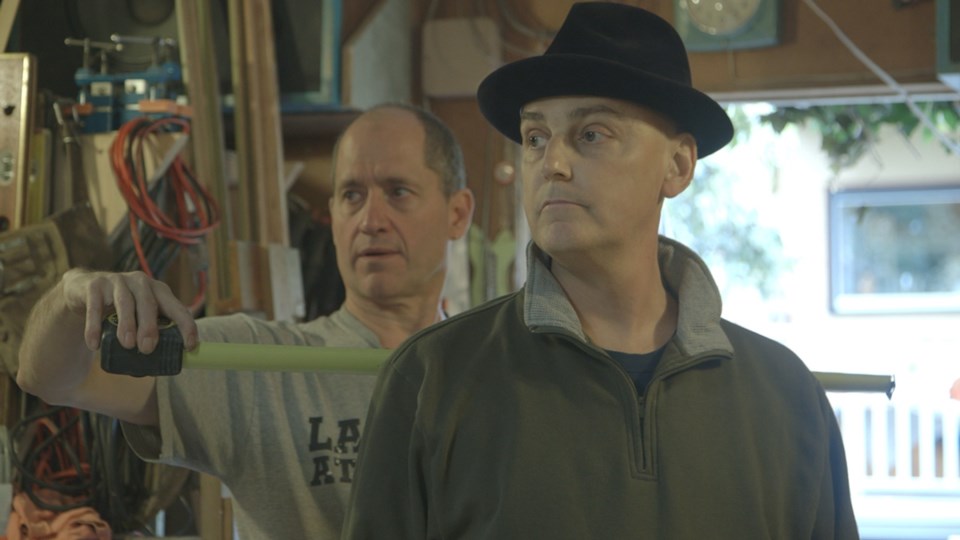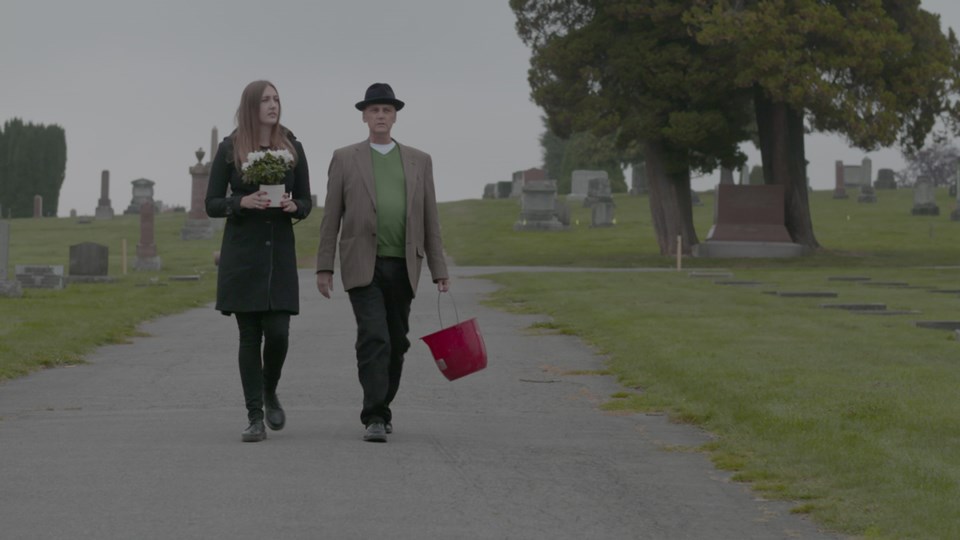Death is one of the only certainties in life, and it’s also one of the only topics we don’t talk about with any real honesty. We couch it in euphemisms; we shove our foreknowledge of it to the darkest corners of our minds, where it gathers dust and becomes even more taboo and terrifying.
But the inextricable relationship between life and death takes centre stage in For Dear Life, Vancouver director-editor Carmen Pollard’s feature film that premieres this week as part of the 2017 DOXA Documentary Film Festival.
For Dear Life follows Carmen’s cousin, Vancouver theatre producer James Pollard, in the three and a half years after his terminal cancer diagnosis. Pollard was the longtime general manager of Theatre Under the Stars and served on the board of directors of the PAL Studio Theatre.
Carmen approached her older cousin with the idea for the film shortly after he received his diagnosis. She recalls telling James that she wanted to “tell a story about [his] experience in the world as someone who knows that they face an imminent death, but is in a culture where everyone is afraid to talk about it and acknowledge it.” At the time, Carmen was already fully immersed in the world of documentary filmmaking: she was a celebrated editor with numerous credits to her name, including Mina Shum’s Ninth Floor, and Dirt, for which she won a Best Picture Editing in a Documentary Leo Award in 2009.

James was keen, says Carmen – “He was really comfortable talking about [his diagnosis], and when he did talk about it, he was surprised by how uncomfortable everyone else felt” – but he had three caveats: he wanted humour and lightness, he didn’t want to be seen “out of his mind with pain opiates,” and he didn’t want his story framed as some kind of hero’s journey.
Thus, For Dear Life isn’t a traditional cancer doc about a brave soul on a life-affirming journey into the great beyond, nor is it a dark narrative about a tragic figure raging against the dying of the light. Instead, it is a conversation-starter about a man who “lived until he died,” says Carmen. “He really didn’t want to die, but he also knew he was dying so he didn’t want to shy away from reality. He wanted to still live a really full and interesting life in the process, and he wanted people to be comfortable with the fact that he was still living.”
James isn’t the only person who appears in For Dear Life, nor was he the only one with whom Carmen had a pre-existing relationship: his father is her uncle; his adult children are her kin. And she was poised to be nearby and on-hand during a transformative series of moments in their lives. She didn’t want to intrude, and she didn’t want the presence of her camera to affect their interactions with each other.
“I did check in with people along the way, just to make sure that having the camera there wasn’t influencing how they were experiencing what James was going through,” says Carmen. “As a documentary filmmaker, you’re in service to the story, and there’s a lot of responsibility around making sure that you’re always putting that first, and there’s also the human side, too, which is as important.”
The process of filming and editing For Dear Life took three years, and gave Carmen more footage than she could possibly use. She accompanied James to medical appointments, to the cemetery where he would ultimately be buried in an unusual bog burial he himself designed, to meetings with his coffin-maker, and into his many revelatory conversations with family and friends. The filmmaking journey afforded Carmen numerous lessons, not the least is “how judgmental we are around death. I’ve concluded it’s because we don’t understand it, and we’re most afraid around what we don’t understand and what we don’t have control over. Fear breeds judgment.”
Although For Dear Life is packed with intimate moments, one moment you will not see is James’ death, despite the fact that James gave Carmen permission to film it. Carmen didn’t feel it was necessary to include James’ passing in order for the film to make its point. “I felt like that moment was sacred,” she says. James died on May 1, 2016, in a Vancouver hospice, surrounded by his family.
If there’s any takeaway from For Dear Life, Carmen wants it to be this: it’s important to be with people who are dying. “For some people, the process of dying can be so isolating, and it’s like they die before they’ve died, because people stop seeing them in the same way that they’ve seen them before.” She pauses and smiles. “I look back and I realize that one of the reasons I wanted to immerse myself in this story was because it was an opportunity to spend that time with James.”
• For Dear Life screens May 7 and 14 as part of DOXA Documentary Film Festival; these screenings will likely be its only ones before it screens on Knowledge Network in 2018. DOXA – which runs May 4-14 at venues around Vancouver - includes 60 shorts and feature-length documentaries from two-dozen countries. For tickets, visit doxafestival.ca.
FOR DEAR LIFE trailer from carmen pollard on Vimeo.


